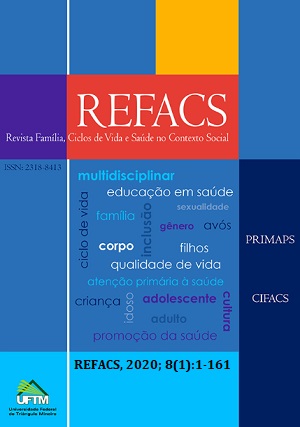Ser irmã de uma pessoa com transtornos do espectro do autismo
DOI:
https://doi.org/10.18554/refacs.v8i1.4455Palavras-chave:
Transtorno autístico, Relações entre irmãos, Relações familiares.Resumo
Este estudo teve como objetivo descrever a experiência de ser irmã de uma pessoa com Transtornos do Espectro do Autismo. Trata-se de estudo descritivo, de abordagem qualitativa, realizado em Brasília. Realizaram-se entrevistas semiestruturadas com sete irmãs de pessoas com transtornos autísticos, selecionadas por amostragem em bola de neve. A coleta de dados ocorreu durante os meses de novembro e dezembro de 2017. Os dados foram transcritos e submetidos à análise de conteúdo temática. Identificaram-se três categorias: A experiência de perceber o irmão com Transtorno do Espectro do Autismo; Convivências e relações familiares; e Cuidar do irmão com Transtorno do Espectro do Autismo. O nível de envolvimento no cuidado do irmão com autismo foi considerado extremo pela maioria das irmãs e impacta nas escolhas profissionais, comportamentos pessoais e amadurecimento precoce. É importante dar visibilidade às necessidades de cuidado em saúde das irmãs de pessoas com autismo, pois estão sujeitas à sobrecarga e sofrimento psíquico ao assumirem responsabilidades para além do papel fraterno.
Referências
Tsai HJ, Cebula K, Liang SH, Fletcher-Watson S. Sibling’s experiences of growing up with children with autism in Taiwan and the United Kingdom. Res Dev Disabil. [Internet]. 2018 [citado em 24 out 2018]; 83:206-16. DOI: https://doi.org/10.1016/j.ridd.2018.09.001
Gomes, PTM, Lima LHL, Bueno MKG, Araújo LA, Souza NM. Autism in Brazil: a systematic review of family challenges and coping strategies. J Pediatr (Rio J) [Internet]. 2015 [citado em 08 jun 2018]; 91(2):111-21. DOI: http://dx.doi.org/10.1016/j.jped.2014.08.009
Whitehead K, Dorstyn D, Ward L. Psychological adjustment in families affected by autism spectrum disorder. J Dev and Phys Disabil. [Internet]. 2015 [citado em 24 out 2018]; 27(5):703-17. Disponível em: https://link.springer.com/article/10.1007%2Fs10882-015-9446-0
Noonan H, O’Donoghue I, Wilson C. Engaging with and navigating limbo: lived experiences of siblings of adults with autism spectrum disorders. J Appl Res Intellect Disabil. [Internet]. 2018 [citado em 24 out 2018]; 31(6):1144–53. DOI: https://doi.org/10.1111/jar.12474
Walton KM, Ingersoll BR. Psychosocial adjustment and sibling relationships in siblings of children with autism spectrum disorder: risk and protective factors. J Autism Dev Disord. [Interent]. 2015 [citado em 08 jun 2018]; 45(9):2764-78. DOI: https://doi.org/10.1007/s10803-015-2440-7
Constantinidis TC, Silva LCS, Ribeiro MCC. “Todo mundo quer ter um filho perfeito”: vivências de mães de crianças com autismo. Psico-USF [Internet]. 2018 [citado em 11 set 2019]; 23(1):47-58. DOI: http://dx.doi.org/10.1590/1413-82712018230105
Meimes MA, Saldanha HC, Bosa CA. Adaptação materna ao transtorno do espectro do autismo: relações entre crenças, sentimentos e fatores psicossociais. Psico [Internet]. 2015 [citado em 11 set 2019]; 46(4):412-22. DOI: http://dx.doi.org/10.15448/1980-8623.2015.4.18480
Ebert M, Lorenzini E, Silva EF. Mães de crianças com transtorno autístico: percepções e trajetórias. Rev Gaúcha Enfem. [Internet]. 2015 [citado em 11 set 2019]; 36(1):49-55. DOI: http://dx.doi.org/10.1590/1983-1447.2015.01.43623
Blumer H. A natureza do interacionismo simbólico. In: Mortensen CD. Teoria da comunicação: textos básicos. São Paulo: Mosaico; 1980. p.119-37.
Vinuto J. A amostragem em bola de neve na pesquisa qualitativa: um debate em aberto. Temáticas. [Internet]. 2014 [citado em 07 jul 2017]; 22(44):203-20. Disponível em: https://www.ifch.unicamp.br/ojs/index.php/tematicas/article/view/2144/1637
Movimento Orgulho Autista Brasil. Sobre nós. [Internet]. Brasília, DF: MOAB; 2018 [citado em 07 jul 2018]. Disponível em: http://www.orgulhoautista.org/sobre-nos
Nascimento LCN, Souza TV, Oliveira ICS, Moraes JRMM, Aguiar RCB, Silva LF. Theoretical saturation in qualitative research: an experience report in interview with schoolchildren. Rev Bras Enferm. [Internet]. 2018 [citado em 12 abr 2018]; 71(1):243-8. DOI: http://dx.doi.org/10.1590/0034-7167-2016-0616
Bardin L. Análise de conteúdo. Reimpr. 1ed. Lisboa: Edições 70; 2016. 282p.
Conselho Nacional de Saúde (Brasil). Resolução nº 466 de 12 de dezembro de 2012. Trata de pesquisas em seres humanos e atualiza a resolução 196 [Internet]. D.O.U., Brasília, DF, 13 dez 2012 [citado em 10 abr 2018]. Disponível em: http://conselho.saude.gov.br/resolucoes/2012/reso466.pdf
Cardoso MF, Françozo MFC. Jovens irmãos de autistas: expectativas, sentimentos e convívio. Saúde (Santa Maria) [Internet]. 2015 [citado em 12 abr 2018]; 41(2):87-98. DOI: http://dx.doi.org/10.5902/2236583415338
Pinto RNM, Torquato IMB, Collet N, Reichert APS, Souza Neto VL, Saraiva AM. Autismo infantil: impacto do diagnóstico e repercussões nas relações familiares. Rev Gaúcha Enferm. [Internet]. 2016 [citado em 05 ago 2018]; 37(3):e61572. DOI: http://dx.doi.org/10.1590/1983-1447.2016.03.61572
Cezar PK, Smeha LN. Repercussões do autismo no subsistema fraterno na perspectiva de irmãos adultos. Estud Psicol. (Campinas) [Internet]. 2016 [citado em 05 ago 2018]; 33(1):51-60. DOI: http://dx.doi.org/10.1590/1982-02752016000100006
Zucker DM, Dion K, McKeever RP. Concept clarification of grief in mothers of children with an addiction. J Adv Nurs. [Internet]. 2014 [citado em 10 out 2018]; 71(4):751-67. DOI: https://doi.org/10.1111/jan.12591
Braconnier ML, Coffman MC, Kelso N, Wolf JM. Sibling relationships: parent-child agreement and contributions of siblings with and without ASD. J Autism Dev Disord. [Internet]. 2017 [citado em 05 ago 2018]; 48(5):1612-22. DOI: https://doi.org/10.1007/s10803-017-3393-9
Loureto GDL, Moreno SIR. As relações fraternas no contexto do autismo: um estudo descritivo. Rev Psicopedag. [Internet]. 2016 [citado em 15 set 2018]; 33(102):307-18. Disponível em: http://pepsic.bvsalud.org/pdf/psicoped/v33n102/09.pdf
Barbosa SRA, Ponte FEFB. O outro lado: os irmãos de pessoas com deficiência. AMAzônica. [Internet]. 2017 [citado em 15 set 2018]; 18(2):260-85. DOI: https://doi.org/10.17979/reipe.2017.0.11.3010
Biondi A, Ries IL. Desconstruções do feminino: uma leitura das postagens de mães de crianças autistas no Facebook. Mediapolis [Internet]. 2018 [citado em 11 set 2019]; (7):139-54. Disponível em: https://impactum-journals.uc.pt/mediapolis/article/view/6113
Muylaert CJ, Delfini PSS, Reis AOA. Relações de gênero entre familiares cuidadores de crianças e adolescentes de serviços de saúde mental. Physis (Rio J.) [Internet]. 2015 [citado em 11 set 2019]; 25(1):41-58. DOI: https://doi.org/10.1590/S0103-73312015000100004
Downloads
Publicado
Edição
Seção
Licença
Este trabalho está licenciado sob uma licença Creative Commons Attribution-NonCommercial 4.0 International License.



